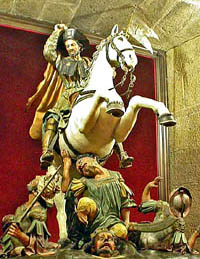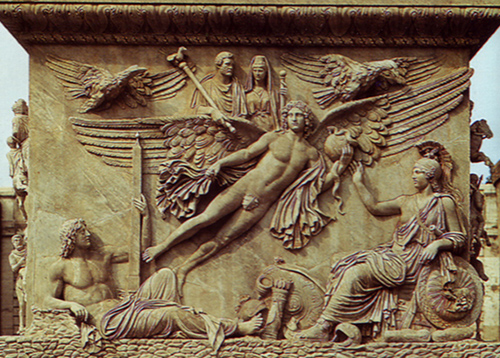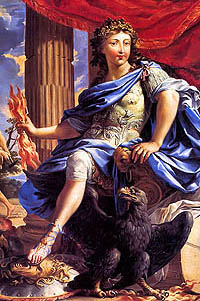|
|
If God were not a necessary being
of himself, He might almost seem to be made for the
use and benefit of mankind.
|
|
John Tillotson (1630-1694), Archbishop
of Canterbury (1691-1694)
|
As anthropologists have long known, there is a widespread tendency
for ordinary mortals to endow their leaders with everlasting
life. This appears to have been the origin of many divine pantheons,
including the ancient Jewish gods. It seems that we mortals
like to feel that our leaders are greater than they really are.
We want them to be immortal.
In Britain King Arthur was held to be destined to return to
his throne at some time in the future, which is why he was styled
the Once and Future King. Around the country there
are many ancient burial mounds that local traditions hold to
be the resting-place of local kings who only sleep, and who
one day will return. Such beliefs are now regarded with benign
amusement, but it is not long ago that they were widely held.
During the Crusades it was reported that St George had returned
to fight for Christendom. Sometimes he bore the arms of England.
During World War I it was widely believed that he had come back
again, still dressed as a crusader, to fight for England against
a new evil. For centuries many believed that Francis Drake would
return to save the country if he was ever needed, and some claim
to have heard his drum during sea battles in the twentieth century.
  This
sort of phenomenon is not peculiar to Britain. St James would
occasionally turn out on his white horse to help the Spanish
forces, just as St George did for the English. Once and future
leaders occur around the world. Chandragupta in India, Cyrus
in Persia, Romulus in Rome , Alexander in Greece, Hakim (according
to the Druzes) in Lebanon , Timur in Uzbekistan, Charlemagne
in parts of Europe , Barbarossa in Germany, Vlad the Impaler
in Romania , Sebastian in Portugal. Often these leaders did
not die: they mysteriously disappeared one day and retired to
some hidden resting place, or were bodily transported to Heaven.
Some Jews seem to have believed that Enoch, Moses and Elijah
were taken up into Heaven without having died*.
Even today there is a reluctance to accept that key national
figures are really dead, and their return is occasionally reported.
Examples of men who have died in recent times and whose earthly
return has been expected, or reported, include Parnell ( Ireland),
General Gordon and Lord Kitchener (Britain) , Zapata ( Mexico),
Hitler ( Germany and Austria), and Che Guevara ( Cuba). Sometimes
there are religious overtones. Towards the end of the twentieth
century both John F. Kennedy and Elvis Presley were reported
to have returned as living persons in the USA. Both have had
religious shrines erected to them, and both have been credited
with miracles. People are simply unwilling to accept the mortality
of their heroes. This
sort of phenomenon is not peculiar to Britain. St James would
occasionally turn out on his white horse to help the Spanish
forces, just as St George did for the English. Once and future
leaders occur around the world. Chandragupta in India, Cyrus
in Persia, Romulus in Rome , Alexander in Greece, Hakim (according
to the Druzes) in Lebanon , Timur in Uzbekistan, Charlemagne
in parts of Europe , Barbarossa in Germany, Vlad the Impaler
in Romania , Sebastian in Portugal. Often these leaders did
not die: they mysteriously disappeared one day and retired to
some hidden resting place, or were bodily transported to Heaven.
Some Jews seem to have believed that Enoch, Moses and Elijah
were taken up into Heaven without having died*.
Even today there is a reluctance to accept that key national
figures are really dead, and their return is occasionally reported.
Examples of men who have died in recent times and whose earthly
return has been expected, or reported, include Parnell ( Ireland),
General Gordon and Lord Kitchener (Britain) , Zapata ( Mexico),
Hitler ( Germany and Austria), and Che Guevara ( Cuba). Sometimes
there are religious overtones. Towards the end of the twentieth
century both John F. Kennedy and Elvis Presley were reported
to have returned as living persons in the USA. Both have had
religious shrines erected to them, and both have been credited
with miracles. People are simply unwilling to accept the mortality
of their heroes.
In the past, mortals who became immortal often went on to become
fully divine. Gilgamesh got to Heaven in this way, and so probably
did Osiris. More than 2,000 years ago Greek philosophers realised
that at least some of their immortals were exaggerated memories
of earlier generals, kings and heroes*.
This did not carry much weight with the masses, who continued
to believe in their immortal gods. Indeed they seem to have
been surprisingly ready to believe that men were gods. According
to Acts 14:11-12, Paul and Barnabas were mistaken for gods on
one occasion*, and later,
Paul was again mistaken for a god by the Maltese (Acts 28:1-6).
In New Testament times Simon Magus was believed by Samaritans
to be a god*. In the Greek
world great rulers were regarded as sharing the essence of divinity.
From the second century BC to the third century AD rulers were
frequently accorded the divine title epiphanes. The
word means manifestation, specifically a divine manifestation,
and is the root of the Christian term Epiphany. The
Romans were liberal with conferred divinity, believing that
they could appoint gods. It became customary for the Roman senate
to elect emperors to the pantheon after their death. Julius,
Augustus, Claudius, Vespasian and Titus for example were all
deified. On his deathbed the Emperor Vespasian joked: "Dear
me, I believe I am becoming a god"*.
Herod Agrippa also reputedly considered himself to be a god*.
|
Apotheosis of Antoninus and Faustina,
from the base of the Column of Antoninus in fhe Campus
Martius (now Piazza di Montecitorio), Rome.
|
 |
  Even
without formal appointments ordinary people have spontaneously
judged great leaders to have turned into gods. Zoroaster never
claimed divinity for himself, but some of his followers were
keen to accord it to him. Siddhartha Guatama became immortal
as a divine Buddha. In Asia there are still communities that
worship Ghengis Khan, and around the Mediterranean there are
saidto be those who worship Alexander the Great. Some leaders
achieved godhead even while still gracing us here on Earth in
human form. Egyptian Pharaohs were gods. Chinese and Japanese
emperors were gods, and some Japanese still regard their living
emperor as a god. Successive Tibetan Dalai Lamas are still in
theory God-kings, as are a few remaining Asian kings such as
those of Nepal and Thailand (though the King of Nepal's divinity
has come into question since a massacre of the Nepalese royal
family in 2001, and then the creation of a Nepalese republic
in 2009). Rastafarians regard the late Emperor Haile Selassi
of Ethiopia as a god. European monarchs no longer claim divinity,
but many of them trace their lineage back to Odin. Even
without formal appointments ordinary people have spontaneously
judged great leaders to have turned into gods. Zoroaster never
claimed divinity for himself, but some of his followers were
keen to accord it to him. Siddhartha Guatama became immortal
as a divine Buddha. In Asia there are still communities that
worship Ghengis Khan, and around the Mediterranean there are
saidto be those who worship Alexander the Great. Some leaders
achieved godhead even while still gracing us here on Earth in
human form. Egyptian Pharaohs were gods. Chinese and Japanese
emperors were gods, and some Japanese still regard their living
emperor as a god. Successive Tibetan Dalai Lamas are still in
theory God-kings, as are a few remaining Asian kings such as
those of Nepal and Thailand (though the King of Nepal's divinity
has come into question since a massacre of the Nepalese royal
family in 2001, and then the creation of a Nepalese republic
in 2009). Rastafarians regard the late Emperor Haile Selassi
of Ethiopia as a god. European monarchs no longer claim divinity,
but many of them trace their lineage back to Odin.
Louis XIV, the Sun King, thought of himself as Jupiter. He
had himself painted as the god, and had no qualms about citing
his divine Olympian status to justify his placing himself human
norms. As he pointed out
to courtiers as he escorted their young wives off to the bedroom
"There is no shame in sharing with Jupiter".
In popular imagination great heros still win a place in heaven
- the process of getting them there is called apotheisis.
|
Apotheosis of St Ignatius by Baciccio
|
 |
|
The Apotheosis of Nelson, 1805 painting
by Scott Pierre Nicolas Legrand
|
|
|
|
The Apotheosis of George Washington and
Abraham Lincoln, 1860
Presumably George is lifting the recently deceased Abraham
into Heaven.
|
|
|
Great religious leaders have foreseen the likelihood of their
followers imagining them to be divine. The Buddha on his deathbed
laughed at his followers for supposing him to be immortal. Mohammed
went to great pains to impress upon his followers that he was
a human prophet, not a god. "There is no God but Allah,
and Mohammed is his prophet". Even so some Muslims identify
men with God. Shi"ite Muslims invest their imams with semi-divine
or even divine powers, the Alawites believe that Mohammed's
son-in-law, Ali, was God. Bohras and Khojas regard their imam
as an embodiment of the Hindu god Vishnu, and, like other Ismailis,
they regard the Aga Khan as at least semi-divine.
The temptation to make men into gods seems to be almost irresistible.
Both Siddhartha and Mohammed foresaw the danger and warned their
followers about people who would want to deify them. Critics
have speculated that if Jesus had been more perspicuous he might
have warned his followers that, after his death, they would
need to watch out for people like Saint Paul who might want
to deify him.
|